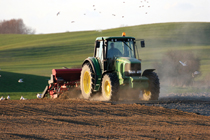Stay safe on the farm through education and training
Tuesday, April 16, 2019
 The planting, growing and harvest seasons are approaching, and this is an important time to remind the community that agriculture is one of the most dangerous industries in the United States.
The planting, growing and harvest seasons are approaching, and this is an important time to remind the community that agriculture is one of the most dangerous industries in the United States.
According to the U.S. Department of Labor’s Census of Fatal Occupational Injuries, in 2017, agriculture had the highest fatal work injury rate, accounting for 581 fatalities, or 23 deaths per 100,000 workers. This is not simply because farms are completely exempt from U.S. Occupational Safety and Health Administration (OSHA) regulations, which is a common misconception. OSHA regulations apply to all farming operations. However, OSHA cannot inspect or issue citations to small farming operations that employ 10 or fewer non-family employees currently – and at all times during the last 12 months – and that have not had an active temporary labor camp during the last 12 months. Even if a farm meets the criteria for the small farm exemption, OSHA regulations should be considered best practice for the safety of everyone involved on the farm.
Safety considerations should include any children living on the farm, working on the farm or visiting the farm. According to the National Children’s Center for Rural and Agricultural Health and Safety, every day 33 children are injured in agriculture-related incidents and, about every three days, a child dies in an agriculture-related incident. These statistics emphasize the importance of teaching children how to stay safe on the farm. Children should have safe play areas, and adults need to talk to children about safety and model safe behaviors on the farm. Working youth should be assigned developmentally-appropriate tasks, supervised by an adult and have a communication plan. Children can also learn farm safety at events hosted by organizations like local 4-H clubs, FFA chapters or extension offices.
At the National Education Center for Agricultural Safety (NECAS), we are proud to host three Progressive Agriculture Safety Days each summer for children ages 4-12, in which we partner with community organizations to teach a variety of lessons on topics such as ATV safety, machinery safety and lawnmower safety.
Safety must remain a top priority during the busy seasons in agriculture, and spring planting is fast approaching. The wet weather this past fall, combined with the delayed snowmelt this spring, will create a sense of urgency among farmers to get fertilizer applied and crops planted. Anhydrous ammonia tanks and planters will be common sites on rural roadways at times – please practice caution and avoid distracted driving. Farmers and motorists should be aware of the potential dangers of trying to pass farm equipment operators turning left. Farmers also need to take their medications as directed and eat regularly. This is especially important for persons with diabetes, to prevent low blood sugar events that could cause loss of consciousness and injury.
First responders should be trained to respond to agricultural incidents. NECAS offers ag rescue trainings for fire/EMS personnel, including manure pit rescue, anhydrous ammonia emergency response and grain bin rescue. Those trainings have resulted in 16 lives saved in nine states.
Grain bin safety training and equipment contributed to successful grain engulfment rescues in Sumner in July 2012 and February 2019. Sumner Fire Chief Tim Duhrkopf and local firefighters, along with Tripoli Fire Department, responded to the scene.
“The first rescue involved an agribusiness facility, with a guy getting sunk into corn waist deep,” Duhrkopf explained. “We were able to use the rescue tubes to remove the corn around him.” The February rescue was similar. A farmer was unloading grain into a semi-truck, but the corn was partially frozen and moving slowly. Trying to speed up the process by hand, the farmer slipped and become immersed above the waist.
They accomplished each rescue in about one hour, said Duhrkopf, a 37-year Sumner Fire Department veteran. “We were really fortunate in both rescues, and now many small towns are acquiring this equipment and getting the education they need from NECAS,” he said.
